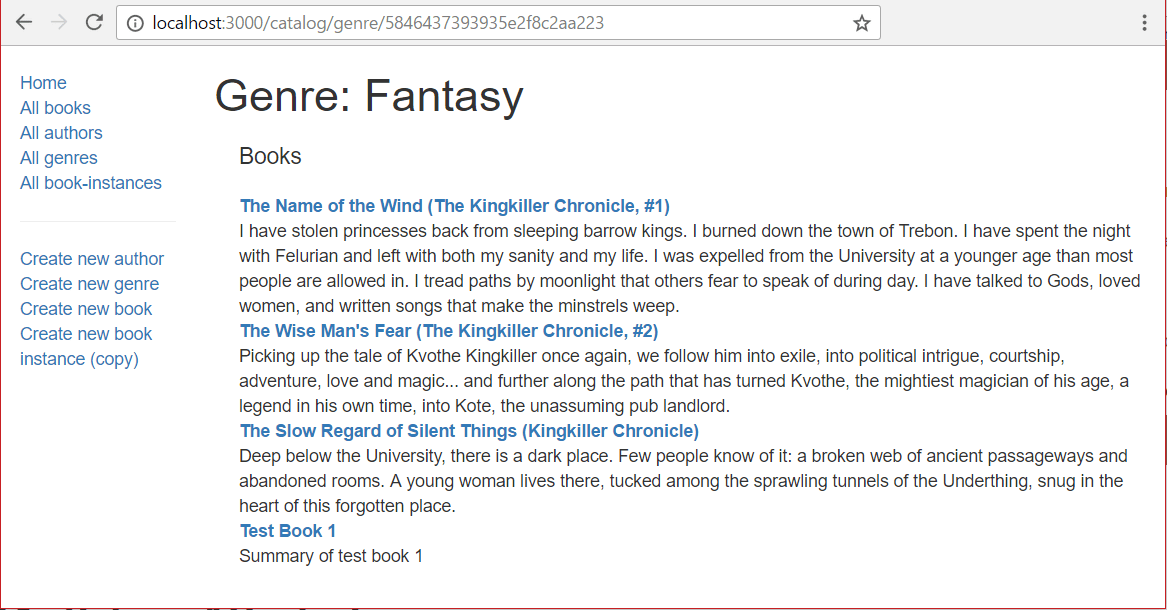Genre detail page
The genre detail page needs to display the information for a particular genre instance, using its automatically generated _id field value as the identifier.
The ID of the required genre record is encoded at the end of the URL and extracted automatically based on the route definition (/genre/:id).
It is then accessed within the controller via the request parameters: req.params.id.
The page should display the genre name and a list of all books in the genre with links to each book's details page.
Controller
Open /controllers/genreController.js and require the Book module at the top of the file (the file should already require() the Genre module and "express-async-handler").
js
const Book = require("../models/book");
Find the exported genre_detail() controller method and replace it with the following code.
js
// Display detail page for a specific Genre.
exports.genre_detail = asyncHandler(async (req, res, next) => {
// Get details of genre and all associated books (in parallel)
const [genre, booksInGenre] = await Promise.all([
Genre.findById(req.params.id).exec(),
Book.find({ genre: req.params.id }, "title summary").exec(),
]);
if (genre === null) {
// No results.
const err = new Error("Genre not found");
err.status = 404;
return next(err);
}
res.render("genre_detail", {
title: "Genre Detail",
genre: genre,
genre_books: booksInGenre,
});
});
We first use Genre.findById() to get Genre information for a specific ID, and Book.find() to get all books records that have that same associated genre ID.
Because the two requests do not depend on each other, we use Promise.all() to run the database queries in parallel (this same approach for running queries in parallel was demonstrated in the home page).
We await on the returned promise, and once it settles we check the results.
If the genre does not exist in the database (i.e. it may have been deleted) then findById() will return successfully with no results.
In this case we want to display a "not found" page, so we create an Error object and pass it to the next middleware function in the chain.
Note: Errors passed to the next middleware function propagate through to our error handling code (this was set up when we generated the app skeleton - for more information see Handling Errors).
If the genre is found, then we call render() to display the view.
The view template is genre_detail (.pug).
The values for the title, genre and booksInGenre are passed into the template using the corresponding keys (title, genre and genre_books).
View
Create /views/genre_detail.pug and fill it with the text below:
pug
extends layout
block content
h1 Genre: #{genre.name}
div(style='margin-left:20px;margin-top:20px')
h4 Books
dl
each book in genre_books
dt
a(href=book.url) #{book.title}
dd #{book.summary}
else
p This genre has no books
The view is very similar to all our other templates. The main difference is that we don't use the title passed in for the first heading (though it is used in the underlying layout.pug template to set the page title).
What does it look like?
Run the application and open your browser to http://localhost:3000/. Select the All genres link, then select one of the genres (e.g. "Fantasy"). If everything is set up correctly, your page should look something like the following screenshot.

Note: You might get an error similar to the one below if req.params.id (or any other ID) cannot be cast to a mongoose.Types.ObjectId().
bash
Cast to ObjectId failed for value " 59347139895ea23f9430ecbb" at path "_id" for model "Genre"
The most likely cause is that the ID being passed into the mongoose methods is not actually an ID.
This could happen, for example, if your intended route had an ID, but another route without an ID was matched first.
Mongoose.prototype.isValidObjectId() can be used to check whether a particular ID is valid.
Next steps
- Return to Express Tutorial Part 5: Displaying library data.
- Proceed to the next subarticle of part 5: Book detail page.